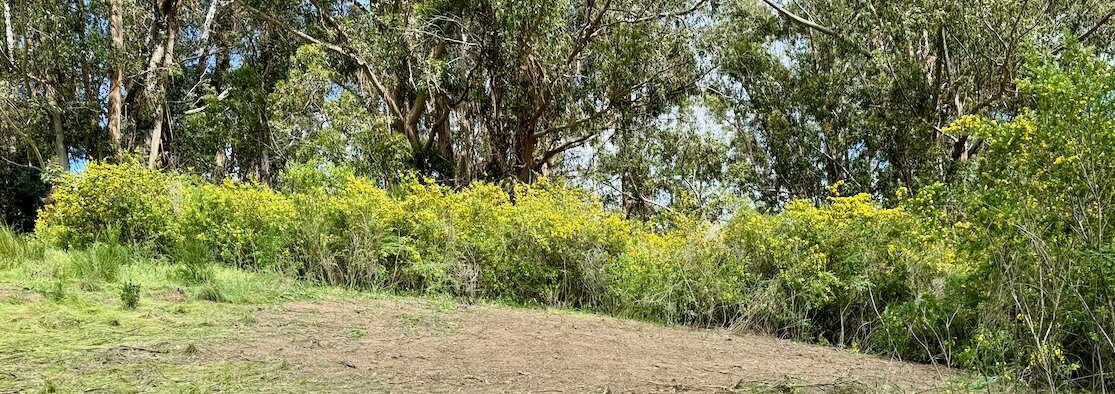
China Camp’s weed buster
Invasive plants don’t stand a chance against David Littlejohn
When it comes to tackling broom, star thistle, and other invasive plants at China Camp, there’s one guy who stands out as the weed ninja. David Littlejohn, a retired chemist from Lawrence Berkeley Lab, is Friends of China Camp’s go-to volunteer when it comes to yanking exotic and invasive plants.

David started volunteering at China Camp in 2018. “It was a Park Champion Day, a Saturday,” he recalls. There, David met longtime volunteer Jim Allen, and Jim suggested David join the regular trail maintenance crew, which met roughly once a week. David did just that.
David quickly became a committed “Crazy,” as the fearless maintenance crew likes to call themselves. Another core volunteer, Joyce Abrams, asked if David if would like to take over efforts to curtail invasive weeds at the park. “I said ‘Okay,” and here I am now,” he says with a shrug and a smile.
Why weeds? According to David, he knew that they were a problem at China Camp, and that they could use some focused attention.
“I was aware that there were nasty plants growing in the park, like French broom and star thistle, but it was new for me to be involved in an organized effort to tackle them,” he says. “Now, I’m much more familiar with the issues related to invasives, for example I’ve learned how persistent broom seeds are in the soil. They can last for years.”
David also recognizes that invasive weed control at China Camp tends to be more about management than eradication, especially since volunteer work is done by hand without herbicides. For example, tall and lanky fennel, an Eurasian native known for its crown of yellow flowers and feathery leaves that smell like licorice, grows readily in the park’s meadows, marshes and along the roadways. “At this point, we can’t really get rid of it, so we just try to limit its spread,” says David.
Tracking that spread is part of David’s job. Working with California State Park’s specialists, he is asked to log invasive species online, using a special tracking app. Some plants that he logs, such as the occasional ornamental shrub that was probably a leftover from a historic garden, aren’t necessarily major threats. “We log them so we can keep an eye on them,” explains David.
Other weeds, such as French and Scotch broom, can be major sources of fuel for wildfires, and David regularly schedules volunteer broom pulls with surrounding neighborhood associations and other volunteer groups.
New invasion causes concern
Another plant has started cropping up in the park, and it’s one that David has quickly dubbed his most troubling species. “Dittrichea, or stinkwort, is my big concern,” he says. According to David, this invasive species is sweeping through Marin, looking like miniature Christmas trees along roadways and other disturbed areas. It can quickly take over meadows and hillsides.
“Five years ago, we didn’t see it, and now it’s spreading so rapidly it’s difficult to control,” David explains. Hand removal is made doubly challenging because the plant’s natural resin can cause an itching, blistering rash, David says. And pulled plants that are flowering must be bagged and disposed of safely, since seeds can continue to develop even when a plant has been yanked out of the soil.
“We don’t know enough yet,” says David. “For example, if we clear it, will it be gone, or will the seeds persist over time, as is the case with broom. It’s really tough to control.”
Despite all these challenges, David is undaunted, and encourages others to come out and help. “Bring your gloves. We can always use you,” he says brightly, noting that even when you’re out pulling weeds, the views at China Camp are beautiful.
To find out more about weed removal events or other volunteer activities at China Camp, visit this page.—by Harriot Manley/FOCC volunteer

